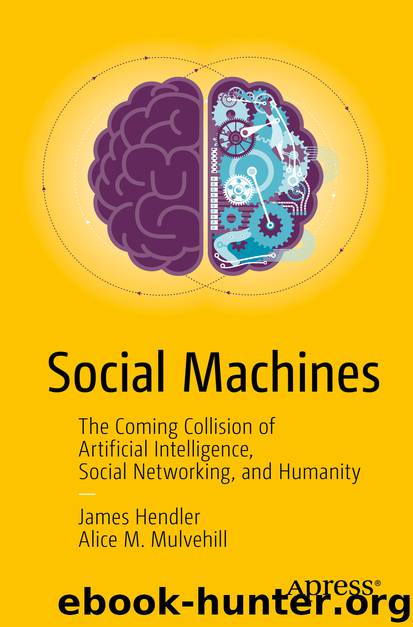Social Machines by James Hendler & Alice M. Mulvehill

Author:James Hendler & Alice M. Mulvehill
Language: eng
Format: epub
Publisher: Apress, Berkeley, CA
The system would then be asked a question like “What did John eat?”
While it would be clear to most people that the correct answer should be “John ate lobster,” it is important to note that the story doesn’t say that explicitly. Rather, you need to bring in “world knowledge,” which is information about people, culture, the world we live in, etc. Answering the question requires that you know what restaurants are (that one eats meals there), and how things go in restaurants (that typically you are served what you order and eat what you are served). A more complex question, like “Why might John have ended up eating something else?” helps make the problem clearer; we not only have to know what typically happens, but also some of the ways things can go wrong in these situations (perhaps the restaurant service was so bad that John got angry and left, maybe they were out of lobster and John had to order something else, maybe when it came the lobster was poorly prepared so John sent it back, etc.).
Trying to figure out how to get a computer to be able to bring world knowledge to bear requires figuring out a way to get that information into the computer. There are two obvious choices: we somehow get the computer to learn it, which we will address later in this chapter, or we find a way to encode that knowledge and program it in. This latter approach is known as Knowledge representation and it has remained a key part of AI research throughout the field’s history.
Early attempts to think about how to get computers to understand the world focused on encoding the information in some sort of logic. Essentially, the computer could be given a set of rules of some kind, and it could apply these rules to reason about situations. However, it became clear pretty quickly that these rules could not be very simple because the real world has so many exceptions. That is, a simple rule like “you get served what you order in a restaurant” is clearly true much of the time, but not always.
Over the years, many different kinds of logics were explored, and to discuss them all would be way beyond the scope of this book, but the key point to take away is that in order for computers to interact with humans, they must have knowledge about the world in which the humans live, and encoding that knowledge remains a significant challenge for AI researchers, meaning that machines are still seriously limited in the kinds of inferencing they can do.
The Expert Systems Paradox
The main theme of this chapter and the previous one is to outline some of the key differences between human and machine cognition. A lesson learned again and again in the AI field has been that often what we think will be easy for a computer, because it is easy for a human, is really hard. Conversely, however, it also turns out that in the AI area, some things that are really hard for humans are not that difficult for AI systems.
Download
This site does not store any files on its server. We only index and link to content provided by other sites. Please contact the content providers to delete copyright contents if any and email us, we'll remove relevant links or contents immediately.
| Computer Vision & Pattern Recognition | Expert Systems |
| Intelligence & Semantics | Machine Theory |
| Natural Language Processing | Neural Networks |
Algorithms of the Intelligent Web by Haralambos Marmanis;Dmitry Babenko(18334)
Jquery UI in Action : Master the concepts Of Jquery UI: A Step By Step Approach by ANMOL GOYAL(10488)
Test-Driven Development with Java by Alan Mellor(7768)
Data Augmentation with Python by Duc Haba(7641)
Principles of Data Fabric by Sonia Mezzetta(7409)
Learn Blender Simulations the Right Way by Stephen Pearson(7327)
Microservices with Spring Boot 3 and Spring Cloud by Magnus Larsson(7162)
Hadoop in Practice by Alex Holmes(6754)
RPA Solution Architect's Handbook by Sachin Sahgal(6542)
The Infinite Retina by Robert Scoble Irena Cronin(6249)
Big Data Analysis with Python by Ivan Marin(5971)
Life 3.0: Being Human in the Age of Artificial Intelligence by Tegmark Max(5558)
Pretrain Vision and Large Language Models in Python by Emily Webber(4927)
Infrastructure as Code for Beginners by Russ McKendrick(4681)
Functional Programming in JavaScript by Mantyla Dan(4564)
WordPress Plugin Development Cookbook by Yannick Lefebvre(4425)
The Age of Surveillance Capitalism by Shoshana Zuboff(4299)
Embracing Microservices Design by Ovais Mehboob Ahmed Khan Nabil Siddiqui and Timothy Oleson(4180)
Applied Machine Learning for Healthcare and Life Sciences Using AWS by Ujjwal Ratan(4162)
